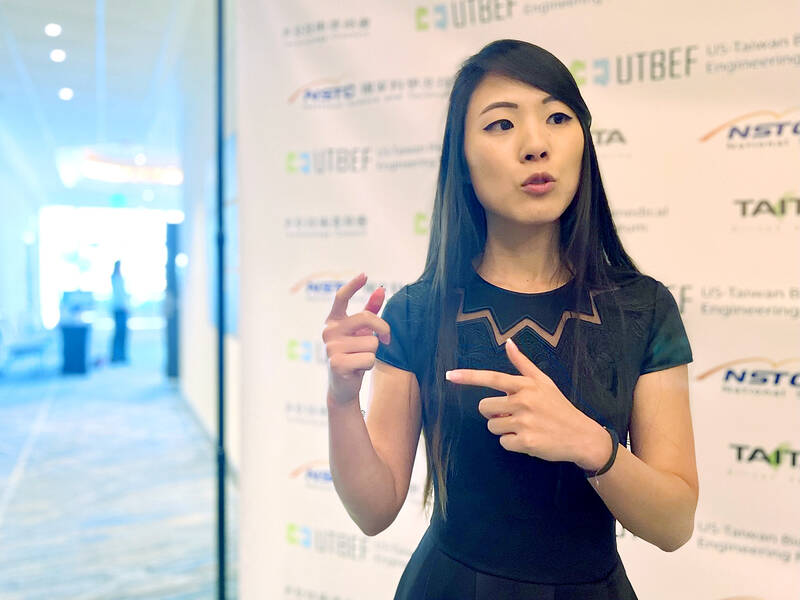A virtual model based on digital twin technology was the highlight of a biomedical engineering forum held jointly by the US and Taiwan in Santa Clara, California, on Tuesday.
With the use of artificial intelligence (AI)-based digital twin technology, doctors would be able to test the effectiveness of medications on a person’s digital twin before administering them, said Renee Yao (姚睿君), global healthcare AI start-ups lead at Nvidia Corp.
AI technology can also be adopted to determine which of the numerous cells in the human body are not functioning well, and thus can help physicians prescribe the right medicines, Yao said at the US-Taiwan Biomedical Engineering Forum (UTBEF).

Photo: CNA
The new technology also allows for faster development of new drugs, Yao said.
“In earlier years, it took at least 10 years to develop a new drug, and it cost about US$10 billion to bring it to market, but now the process takes only two months and costs about US$2 million,” she said.
The digitalization of genomic and organ data, as well as surgery, gives researchers and healthcare professionals access to a digital world in which they can simulate, validate and predict outcomes with greater accuracy, Yao said.
A digital twin is a virtual model that is designed using real-world data to accurately reflect a physical object, combining several core technologies such as AI, the Internet of Things, the cloud and extended reality, according to experts.
Nvidia has been at the forefront of efforts to adopt such technologies for use in the healthcare sector, providing support to more than 1,800 healthcare start-ups in the fields of digital health, medical instruments, medical imaging, genomics and drug discovery.
The US firm’s representative was among 17 other experts from the US and Taiwan who attended this year’s UTBEF physically or virtually to discuss ways to solve problems in the biomedical sector.
The Taiwanese attendees included former National Taiwan University Hospital superintendent Ho Hong-nerng (何弘能), Harvard Medical School assistant professor Yu Kun-hsing (余坤興) and Chen Huei-sheng (陳惠生), a doctor and faculty member at Indiana University School of Medicine.
UTBEF was launched in 2008 by Joseph Yang (楊啟航), former director of the Science and Technology Division at the Taipei Economic and Cultural Office in San Francisco. Since 2014, the Taiwanese American Industrial Technology Association Silicon Valley has hosted it.

Sweeping policy changes under US Secretary of Health and Human Services Robert F. Kennedy Jr are having a chilling effect on vaccine makers as anti-vaccine rhetoric has turned into concrete changes in inoculation schedules and recommendations, investors and executives said. The administration of US President Donald Trump has in the past year upended vaccine recommendations, with the country last month ending its longstanding guidance that all children receive inoculations against flu, hepatitis A and other diseases. The unprecedented changes have led to diminished vaccine usage, hurt the investment case for some biotechs, and created a drag that would likely dent revenues and

Macronix International Co (旺宏), the world’s biggest NOR flash memory supplier, yesterday said it would spend NT$22 billion (US$699.1 million) on capacity expansion this year to increase its production of mid-to-low-density memory chips as the world’s major memorychip suppliers are phasing out the market. The company said its planned capital expenditures are about 11 times higher than the NT$1.8 billion it spent on new facilities and equipment last year. A majority of this year’s outlay would be allocated to step up capacity of multi-level cell (MLC) NAND flash memory chips, which are used in embedded multimedia cards (eMMC), a managed

CULPRITS: Factors that affected the slip included falling global crude oil prices, wait-and-see consumer attitudes due to US tariffs and a different Lunar New Year holiday schedule Taiwan’s retail sales ended a nine-year growth streak last year, slipping 0.2 percent from a year earlier as uncertainty over US tariff policies affected demand for durable goods, data released on Friday by the Ministry of Economic Affairs showed. Last year’s retail sales totaled NT$4.84 trillion (US$153.27 billion), down about NT$9.5 billion, or 0.2 percent, from 2024. Despite the decline, the figure was still the second-highest annual sales total on record. Ministry statistics department deputy head Chen Yu-fang (陳玉芳) said sales of cars, motorcycles and related products, which accounted for 17.4 percent of total retail rales last year, fell NT$68.1 billion, or

In the wake of strong global demand for AI applications, Taiwan’s export-oriented economy accelerated with the composite index of economic indicators flashing the first “red” light in December for one year, indicating the economy is in booming mode, the National Development Council (NDC) said yesterday. Moreover, the index of leading indicators, which gauges the potential state of the economy over the next six months, also moved higher in December amid growing optimism over the outlook, the NDC said. In December, the index of economic indicators rose one point from a month earlier to 38, at the lower end of the “red” light.